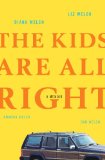 Survival through a childhood wracked with grief and loss sure does make for good memoir material, and for some unknown reason, I’m attracted to these types of tales. Released last year, The Kids Are All Right is written in alternating voices of the four Welch siblings, Liz, Diana, Amanda and Dan, and it captures individual perspectives on the experience of growing up in the shadow of losing both parents within a few years, and the crazy aftermath of separation and personal struggles.
Survival through a childhood wracked with grief and loss sure does make for good memoir material, and for some unknown reason, I’m attracted to these types of tales. Released last year, The Kids Are All Right is written in alternating voices of the four Welch siblings, Liz, Diana, Amanda and Dan, and it captures individual perspectives on the experience of growing up in the shadow of losing both parents within a few years, and the crazy aftermath of separation and personal struggles.
In the telling of the family’s story, from the time before their father’s death in a car accident through the time of the death of their mother from cancer only a few years later, the siblings give their individual perspectives, which while unique, do not incite any significant squabblings over details. The meat of the story comes afterward, when they face unpredictable futures as each child’s care is assigned in different directions. Unfortunately, some of the methods of coping the three older siblings opt for are surely unhealthy and self-destructive. I felt the most compassion for the youngest sibling, Diana, who was too young to fully understand the enormity of the situation and was sent to live with a family who didn’t provide the emotional support that the young girl clearly needed. Diana’s recounting of her experiences made me wince, for the callous and unexplainably hurtful nature of the mother was difficult to read.
I’ve read some criticism of the book posed by readers that questions the actions of the older siblings and the perception of their lack of regret for it, as well as the literary skills of particular siblings. I can certainly agree that the four written voices are not equal in literary quality, but that didn’t take away from my enjoyment of the book. I expected four different voices, and I certainly got what I expected– some are more talented writers, others are gruffer and more prone to use stronger language, and this only served to individualize the siblings for me. As for the other, well, I guess I expected drugs, alcohol and sex to play some part in the teenagers’ post-parental loss lives as much for the time period (the 80s) and the culture and lifestyle they were accustomed to (well-off, with connections to the entertainment business because of their mothers’ acting career). My only frustration with the memoir is how it is finalized, culminating in the winter of 1991 with some events that made me as a reader feel that hopefully the kids would be all right… eventually. Perhaps I expected more of a “where are they now?” sort of wrap-up, and that isn’t evident in the book. Although I haven’t browsed the book’s official website, The Kids are All Right The Book, I have a feeling there is more current information and perspectives that give more credence to the book’s title.
For fans of memoir selections that offer stories of survival in the face of emotional loss and upheaval, The Kids Are All Right provides just that, in four unique voices.
Dawn prays that her children never have cause to write any type of memoir, tell-all or otherwise, when they grow up, but she delights in sharing some of the family stories on her blog, my thoughts exactly.
I wanted to love this book, and I did love the 4 viewpoints, but it just didn’t do it for me at all.
Like you, I was disappointed that there was no proof that the kids were indeed all right. I was not really interested in their lives.
Yeah, I liked it enough, but I did hope for some more resolution, I guess. I was interested, but I needed more convincing that they were truly all right.